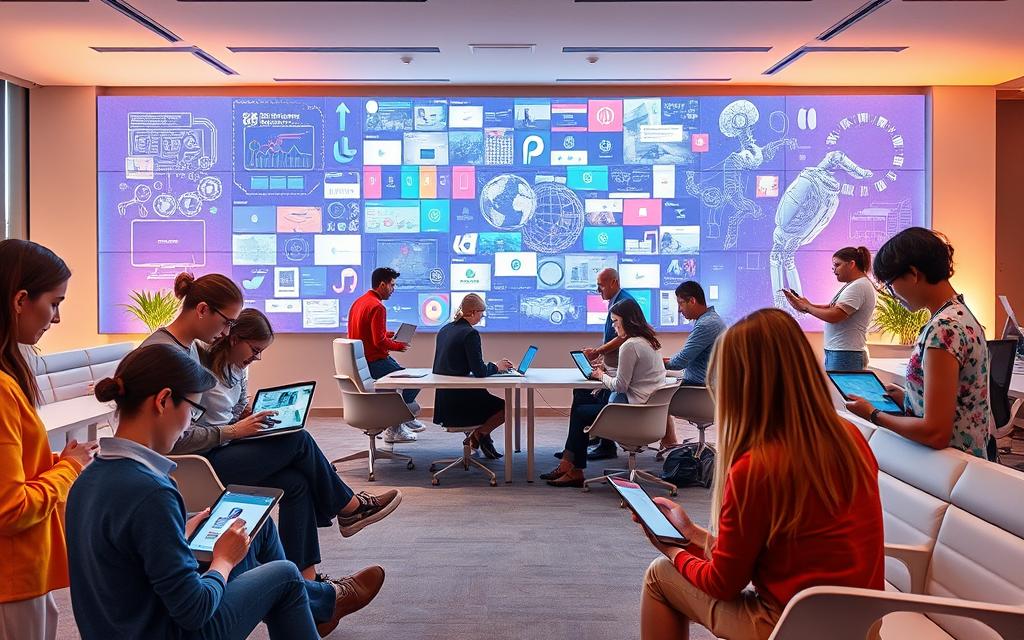Technology changes fast. Fields like artificial intelligence, cloud computing, and blockchain keep evolving. This shows no signs of slowing down.
Keeping up with these technology updates is now key for IT pros. It’s not just nice to do; it’s necessary for your career to thrive.
For IT pros, continuous learning is a must. Being proactive about learning new skills is vital for your career growth.
Lifelong learning is about seeing education as a journey, not a finish line. It’s the best way to stay relevant in our rapidly changing digital world.
Why Knowing How to Update Yourself with Latest Technology Matters
In today’s world, technology changes fast. Keeping up with these changes is key for success and growth. This part looks at why it’s vital to stay updated with tech throughout your career.
The Rapid Pace of Technological Change
Technology moves quickly, with new things coming out every year. What’s new today might be old tomorrow. This change affects all areas, from health to finance.
Here are some facts about how fast tech changes:
- More than half of today’s tech skills are outdated in two years
- New programming languages and frameworks come out every quarter
- Artificial intelligence gets twice as good every six months
To stay relevant, you must keep learning. If you don’t, your skills will soon be out of date.
Benefits for Career and Personal Growth
Keeping up with tech brings big benefits for your career. Employers want people who know the latest tech.
The main advantages are:
- You become more employable in many fields
- You can earn more and negotiate better
- You get chances for leadership and special roles
But tech skills are good for more than just work. They help you solve problems better, understand digital stuff, and be more creative. Knowing new tech lets you make smart choices about the tools we use every day.
Common Challenges and How to Overcome Them
Many people struggle to keep their tech skills up to date. Knowing these problems is the first step to solving them.
The biggest hurdles are:
- Not having enough time because of work and life
- Being overwhelmed by too much information
- Doubting your ability to learn new things
There are ways to tackle these issues. Learn in short, daily sessions of 15-30 minutes. Start with the basics before moving on to harder stuff.
Choose your learning sources wisely. Stick to a few good tech journals and educational sites. Remember, even experts keep learning. This approach makes learning more fun and less stressful.
Foundational Methods for Staying Current
To grow in technology, you need a solid plan. This plan should mix learning with joining communities. These steps give you the knowledge and hands-on experience needed in today’s digital world.
Continuous Learning Through Online Courses
Digital learning sites have changed how we learn. Now, you can learn new skills anytime, anywhere. These online courses are made by experts and universities. They ensure you learn the latest and most relevant information.
These sites offer flexible learning. This means you can learn at your own pace. You can keep up with work or other life commitments. And, you get official certificates for what you’ve learned.
Platforms like Coursera and edX
Coursera works with top schools and companies. They offer specialisations and certificates in many tech areas. Their courses focus on practical skills, helping you apply what you learn.
edX also has high-quality courses from places like Harvard and MIT. Both sites have:
- Interactive learning materials with video lectures and exercises
- Peer-reviewed assignments for feedback
- Verified certificates to show your skills
- Access to course materials even after you finish

Engaging with Professional Communities
Learning from courses is great, but professional communities are even better. They offer a place to share ideas and learn from others. Here, you can see new tech trends and join discussions.
Being part of these communities helps you see different views and ways to solve problems. You also get to meet mentors and peers who can help you on your learning path.
As Harvard’s study on professional skills shows, being part of communities is key. It helps you stay up-to-date in a fast-changing work world.
Using LinkedIn and Tech Forums
LinkedIn is more than a job site. It’s a place to learn from professionals. Follow leaders, join groups, and talk in discussions to learn about trends and best practices.
Tech forums and discussion boards are great for deep tech talks. Sites like Stack Overflow, GitHub Discussions, and Reddit’s tech groups offer:
- Real solutions from experts
- Early looks at new tech and methods
- Chances to share your knowledge and build your reputation
- Networking with developers and experts worldwide
These online places are where curiosity meets knowledge. They help you grow by sharing and learning together.
Step-by-Step Plan to Update Your Tech Skills
Having a clear plan helps you improve your skills steadily. It keeps you focused and avoids feeling overwhelmed. This plan will guide you from checking your skills to putting them into action.
Assess Your Current Knowledge and Goals
First, figure out what you know now and what you want to learn. Knowing this helps you avoid spending time on things you don’t need to learn.
Conducting a Skills Audit
A detailed skills audit shows what skills you have and what you need. Make a list of your current skills and the new ones you want to learn.
Here are some ways to check your skills:
- Look at job descriptions for jobs you want
- Compare your skills with what the industry needs
- Ask for feedback from people you work with or mentors
Create a Personal Learning Schedule
Learning a little bit every day is better than trying to cram it all in at once. Make a plan that fits your life but keeps you moving forward.
Setting Realistic Timelines
Break big goals into smaller steps. A good learning schedule might include:
- 30-60 minutes each day for reading and tutorials
- 2-3 hours a week for deeper study
- Monthly check-ins to see how you’re doing
Learning a little bit every day is often better than trying to learn a lot all at once.
Implement Learning with Hands-On Projects
Learning by doing makes knowledge real. Hands-on projects turn abstract ideas into skills you can use.
Building a Portfolio or Practising with Real Tools
Do projects that solve real problems or mimic work. This way, you learn by doing and show what you can do.
- It makes learning stick by applying it
- It shows you can do the job
- It boosts your confidence with new tech
Start with open-source projects or personal automation tasks.
Regularly Review and Adapt Your Approach
Technology changes fast, so your learning plan should too. Check in often to make sure you’re on the right track.
Using Feedback and Metrics
Watch your progress with more than just course completion. Track:
- How many projects you finish and how hard they are
- How you use your new skills in real life
- What others say about your skills
Change your plan every quarter based on how you’re doing and what’s new in tech.
Essential Tools and Resources for Lifelong Learning
Having the right tools makes learning easier. The digital world has many tools for learning and growing. These tools help you stay up-to-date with technology.
Online Learning Platforms and Certifications
Digital education has changed how we learn new things. Online learning platforms offer courses in many tech areas. You can learn from beginner to expert levels.
Many platforms give certifications that boost your career. These certifications show you’re committed to your field.
Examples: Udemy, LinkedIn Learning, and Google Certifications
Some platforms are known for their tech courses:
- Udemy has thousands of courses on programming, data science, and IT certification prep
- LinkedIn Learning offers courses that match your LinkedIn profile
- Google Certifications give you recognised credentials in IT support, data analytics, and project management

Tech News Sources and Journals
Keeping up with tech news is key. Reliable sources of tech news are essential. They keep you updated on new trends, products, and market changes.
Good journalism explains the reasons behind new tech. It helps you understand the impact of technology.
Subscribing to Wired, TechCrunch, and IEEE Spectrum
These publications offer different views on technology:
- Wired looks at technology’s effects on culture, economy, and politics
- TechCrunch focuses on startups, venture capital, and tech news
- IEEE Spectrum covers deep technical engineering and technology developments
Think about subscribing to their newsletters. You’ll get updates daily or weekly in your inbox.
Networking and Mentorship Opportunities
Learning is better with others. Networking opportunities connect you with experts and peers. They help you learn faster.
These connections lead to sharing knowledge and new opportunities. You might find things you wouldn’t discover alone.
Attending Webinars and Joining Groups like Meetup
Events, online and in-person, create learning communities:
- Webinars offer expert insights with live Q&A
- Meetup groups unite local professionals with similar interests
- Professional associations host conferences and groups
For a wide range of digital tools, check out our guide to the top learning apps. They support continuous skill growth.
Using these resources together creates a strong learning environment. The right mix of education, awareness, and community keeps you ahead in tech.
Conclusion
Your commitment to learning shapes your future in our fast-changing digital world. The strategies we’ve discussed help you stay relevant in tech fields.
Platforms like Coursera, Udemy, and LinkedIn Learning offer structured learning paths. They help you gain new skills. By doing hands-on projects, you turn theory into practical skills.
This journey is not just about learning new skills. It makes your career strong and adaptable to changes. Staying connected with tech communities and reading tech news keeps your knowledge up-to-date.
Start using these strategies now. Set goals, track your progress, and update your learning plan as tech changes. Your commitment to learning ensures your career stays valuable and innovative.
FAQ
Why is it essential to keep up with the latest technology?
Keeping up with technology is key because fields like AI, cloud computing, and blockchain change fast. It helps you stay ahead in your career and grow personally. It’s also essential for survival and growth in today’s fast-paced industries.
What are the main challenges when trying to update tech skills, and how can I overcome them?
Challenges include finding time and feeling unsure. To tackle these, break learning into smaller parts. Focus on the basics first and set achievable goals. Small, consistent efforts can boost your confidence and make learning easier.
Which online platforms are recommended for continuous learning in technology?
Sites like Coursera, edX, Udemy, and LinkedIn Learning are top choices. They offer courses in programming, data science, and cybersecurity. These platforms have structured learning, certifications, and flexible schedules for all levels.
How can professional communities help in staying updated with technology?
Joining LinkedIn, tech forums, and Meetup groups is beneficial. They offer knowledge sharing, networking, and mentorship. You get insights, practical tips, and chances to work on projects, improving your skills and career.
What steps should I take to create an effective learning plan for tech skills?
First, check your current skills and set clear goals. Then, make a detailed plan, include practical projects, and review your progress often. Adjust your plan based on feedback and industry changes to keep improving.
Where can I find reliable sources for tech news and updates?
Wired, TechCrunch, and industry journals are trusted sources. They offer the latest on tech trends and innovations. Subscribing to their newsletters or following them keeps you updated and helps you make informed learning choices.
How important is practical experience when updating tech skills?
Practical experience is essential. It makes theoretical knowledge real and boosts confidence. Working on projects, whether personal or professional, lets you apply new skills and show your abilities to employers or clients.







